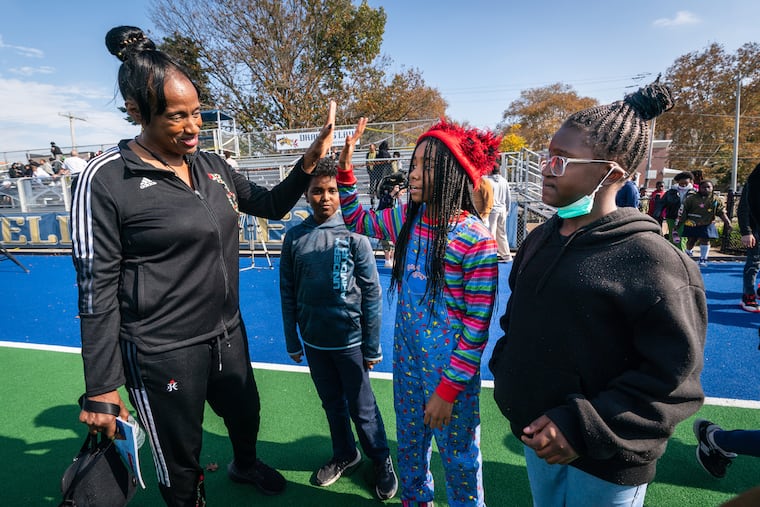Olympic legend Jackie Joyner-Kersee meets with students at Drexel’s Vidas Field Day
The event, led by Drexel coaches and athletes, was held in a partnership with the West Philadelphia Promise Neighborhood organization to encourage kids to stay active.

When Olympics track and field champion Jackie Joyner-Kersee was just a freshman at UCLA, she lost her mother unexpectedly. She traveled back to her hometown of East St. Louis, Ill., looking for comfort.
The local recreation center is where she had found that growing up, but when she arrived, the center that welcomed her was padlocked and closed down.
“At 18 years of age, I started thinking, ‘Where do the young people go?’ “ Joyner-Kersee said Monday at Drexel University during the third annual Vidas Field Day. “That community center gave me so much.”
Joyner-Kersee made it a goal to give back to the youth one day. Along the way, she broke barriers as a multi-sport athlete and won three gold, one silver, and two bronze Olympic medals in the heptathlon and long jump over four Olympic Games (1984, 1988, 1992, 1996).
She became the first African American woman to win an Olympic gold medal in long jump, and still holds the U.S. record in the event (24 feet, 7 inches), as well as the U.S. and world records in the heptathlon (7,291 points).
In 1988, she established the Jackie Joyner-Kersee Youth Center Foundation, which advocates for all people to gain access to education and sports. The foundation has expanded over the years, with her most recent philanthropic work coming from a children’s book, Running for the Gold: Connecting Kids to Dreams, which was released last year and mentions how children can reach their dreams through hard work.
Joyner-Kersee, 61, shared morsels of the book on Drexel’s campus Monday to more than 200 students from the Alain Locke School, located near the university’s athletic fields. Drexel donated 2,500 of her books to students in schools throughout West Philly.
Vidas Field Day was held in a partnership with the West Philadelphia Promise Neighborhood organization to encourage students from Alain Locke to stay active. Drexel coaches and student-athletes ran the activities, which included dance and soccer.
This is the first year Drexel had a guest speaker during the event.
“The reality is that she broke barriers as an athlete, as a multi-sport athlete, and as a woman of color,” said Drexel athletic director Maisha Kelly. “It is incredible that she continues to give her time and presence, because showing up matters. As someone who also is in a position of leadership and a person of color, seeing that matters.”
Joyner-Kersee spoke to the students ahead of the activities about overcoming obstacles.
She told the crowd: “You can do anything you put your mind to. I was told that I wasn’t going to amount to anything and by the time I turned 14, I would be pregnant. ... We’re not going to let negative people put negative thoughts into your mind.”
Community schools coordinator Jared Beck has been working at Alain Locke for five years and strives to find alternative and special education classroom settings for students. He said this event with Drexel has been one of his favorites because it gives students “hope” and leaves them with a lasting memory.
“Our kids don’t often have opportunities to just play,” Beck said. “We have such high expectations on their schoolwork, attendance, and their behavior that even with recess, it’s only 20 minutes, so we bring them here and the only thing that we expect of them is to play.
“Representation is also something that we are really sensitive about, because these kids need to see what that looks like. ...To be a runner, to be someone in sports, this just proves to them that it is possible.”
Kelly and assistant athletic director Peaches Brown, a Northeast High School graduate, want to expand the event to include more schools in the West Philly area with additional keynote speakers. They also hope the volunteer work will provide their student-athletes with valuable lessons and better connect them with the community.
“Our athletes don’t just come here to play their sport and graduate,” Brown said. “The kids in their local neighborhood may want to be them someday, so the ability to host an event where we’re giving back to the community, and exposing them to university athletics is really what it’s all about.”